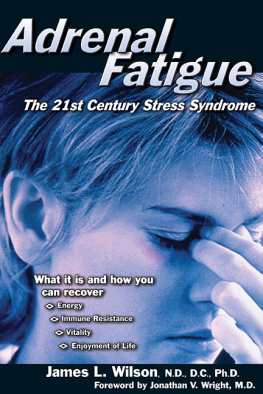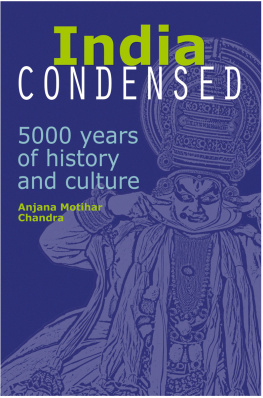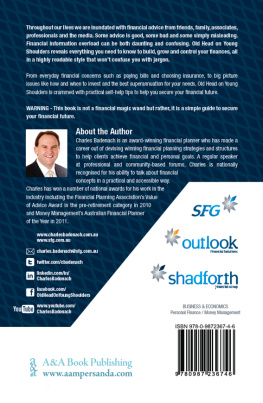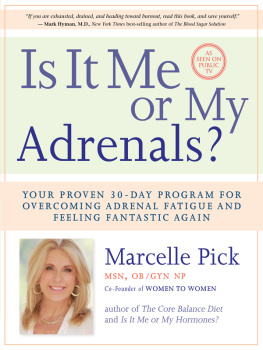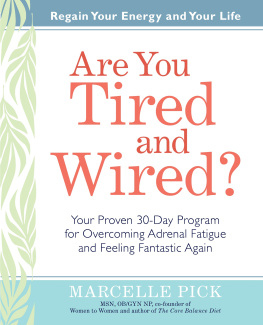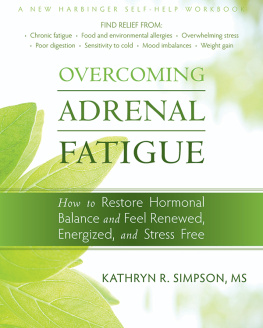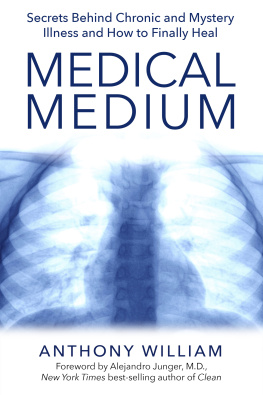Ebooks Corporation. - Adrenal Fatigue: the 21st Century Stress Syndrome
Here you can read online Ebooks Corporation. - Adrenal Fatigue: the 21st Century Stress Syndrome full text of the book (entire story) in english for free. Download pdf and epub, get meaning, cover and reviews about this ebook. City: Lanham, year: 2010, publisher: Smart Publications, genre: Romance novel. Description of the work, (preface) as well as reviews are available. Best literature library LitArk.com created for fans of good reading and offers a wide selection of genres:
Romance novel
Science fiction
Adventure
Detective
Science
History
Home and family
Prose
Art
Politics
Computer
Non-fiction
Religion
Business
Children
Humor
Choose a favorite category and find really read worthwhile books. Enjoy immersion in the world of imagination, feel the emotions of the characters or learn something new for yourself, make an fascinating discovery.
- Book:Adrenal Fatigue: the 21st Century Stress Syndrome
- Author:
- Publisher:Smart Publications
- Genre:
- Year:2010
- City:Lanham
- Rating:4 / 5
- Favourites:Add to favourites
- Your mark:
- 80
- 1
- 2
- 3
- 4
- 5
Adrenal Fatigue: the 21st Century Stress Syndrome: summary, description and annotation
We offer to read an annotation, description, summary or preface (depends on what the author of the book "Adrenal Fatigue: the 21st Century Stress Syndrome" wrote himself). If you haven't found the necessary information about the book — write in the comments, we will try to find it.
Ebooks Corporation.: author's other books
Who wrote Adrenal Fatigue: the 21st Century Stress Syndrome? Find out the surname, the name of the author of the book and a list of all author's works by series.
Adrenal Fatigue: the 21st Century Stress Syndrome — read online for free the complete book (whole text) full work
Below is the text of the book, divided by pages. System saving the place of the last page read, allows you to conveniently read the book "Adrenal Fatigue: the 21st Century Stress Syndrome" online for free, without having to search again every time where you left off. Put a bookmark, and you can go to the page where you finished reading at any time.
Font size:
Interval:
Bookmark:
Dr. Wilson has helped hundreds of people with adrenal fatigue regain their health and vitality during his 24 years of private practice. For the past 10 years he has also lectured extensively to physicians and is acknowledged as an expert on adrenal function and other endocrine imbalances, and their impact on health. With a researchers grasp of the science behind adrenal function and a clinicians understanding of its human impact, he has helped many understand the physiology behind the condition.
One of the few people to hold 3 doctorate degrees and 2 masters degrees, all from different disciplines, he received his Ph.D. in Human Nutrition from the University of Arizona, with minors in immunology, microbiology, pharmacology and toxicology. In addition, he holds degrees as a Doctor of Chiropractic and Doctor of Naturopathic Medicine. His masters degrees are in bio/nutrition and experimental psychology.
Dr. Wilson was also one of 14 founding fathers of the Canadian College of Naturopathic medicine (CCNM) in Toronto, Ontario. He is listed in The International Whos Who in Medicine (Cambridge, England) and currently resides in Tucson, Arizona.

About the illustrator-Richard Capener is a graphic artist, cartoonist and video producer living on his 50 acre farm in rural Ontario, Canada. E-mail: capenerrichard@hotmail.com.
This book would not have been writ en without the help and encouragement of many people. My deepest gratitude goes out to all those who as patients, friends, colleagues, students and family showed me how much a book like this was needed. I would like to gratefully acknowledge the following people for their roles in making this book a reality.
Thanks to Dr. Ward Dean who first prompted me to write this book. His inspiration and encouragement provided the spark and the decision to write it.
I would also like to thank the American College for Advancement in Medicine (ACAM), with a special thanks to ACAMs Dr. Jack Young and Dr. Michael Hanson, for repeatedly inviting me back to speak on the diagnosis and treatment of adrenal fatigue. Through the continual gathering of material for these lectures, the book took much of its form.
Finding a publisher is often the most difficult task for an author. Fortunately for me Smart Publications was willing to take the risk of publishing this book based primarily on a tentative outline, an audio cassette of one of my lectures and my reputation.
Next, I would like to thank Neera Jain who helped compile many of the references used in this book and thousands that do not appear, but were researched in the preparation of its writing. Thanks also to the University of Arizona Medical Library staff, especially Na Nguyen, Hanna Fisher, Fred Heidenreich, Mary Riordan and Cathy Wolfson who were always more than willing to help.
I am grateful to Dr. Gary Gordon who provided many of the historical texts and research papers that added substance, filled in many of the historical gaps and answered many of the questions about the early research and clinical reports of adrenal fatigue.
My appreciation and thanks also goes out to Dr. Jonathan Wright whose keen interest in this area prompted him to offer to write the foreword to this book.
I would also like to thank my many, many patients who have shared personal information and been dedicated enough to their health to follow through with my suggestions. It has been so wonderful to see their lives turn around. Some of their stories appear in this book.
Susan Nickol had the onerous task of transcribing my writing into readable text. She worked tirelessly on the initial copy and various revisions without complaint. Her cheerful presence in my office while managing to expertly type the book around her other duties was greatly appreciated.
After eating, breathing and living a book, a writer becomes blind to the writing. I am very grateful to Florencia Patterson, Marie Wagner, Dr. Tim Lohman, Dr. Michael Stone and Deborah Mitchell who very generously agreed to review this book and to point out needed changes.
Every Thursday morning I meet with a group of 7 men. These men have given their continual support for me to write this book. Thanks to: Joe Breck, Michael, Kiropatkin; John Eisele, Tim Lohman, James Hamilton, Jack Halstead and Bill Mawhinney.
My wife Viviens constant encouragement and belief in the importance of bringing this information to light were essential. Over the past 2 years, she has been my staunchest supporter as well as my greatly valued editor who helped write and rewrite the entirety of the book. She also contributed her expertise as a hypnotherapist and meditation instructor to the meditation and reframing sections of the book.
Thanks also to my 4 children who have faithfully cheered me on and sacrificed many hours of our time together so that this book could be written. I was especially touched when my 13-year-old son told me that what he wanted for his birthday was for my book to be finished. This book was indeed a family affair.
The user friendliness of this book has been enormously enhanced by the wonderful cartoons and illustrations done by Richard Capener. Richards exceptional talents as an artist have perceptively and sympathetically captured the essence of adrenal fatigue.
I owe so much to people I have never met, especially the pioneering doctors of the 1920-40s who organized the various manifestations of adrenal fatigue into a recognizable syndrome. Their writings continue to inspire. I hope that this book will be true to their fine example and bring relief to the many who are suffering from this distressing but often hidden disorder.
The Glycemic Index
The glycemic index (GI) is a way of systematically measuring how much a carbohydrate triggers a rise in circulating blood sugar. The higher the number, the more your blood sugar will rise in response to eating that food. Therefore, as a general rule, choose foods that have lower glycemic index numbers in preference to foods with higher ones. The GI given here is taken from information provided by Dr. Rick Mendosa, co-author of : The Authoritative Guide to the Glycemic Index. Marlowe & Company; New York on his website at www.mendosa.com/gilist/htm. and is a summary of over 80 studies. He updates this site regularly, so if you are interested in keeping up with the latest in GI information, this is a good source. The GI shown here compares the food in the left column with eating white bread (white bread has a value of 100 on the GI scale) The amounts of food consumed is assumed to be about 50 grams (a little less than 2 ounces). But the numbers here shouldnt be taken to be absolute numbers. They are only relative numbers so you can compare foods to each other using this scale.
Dont interpret this as 100 is OK and anything above 100 is high and anything below 100 is not. That is not the correct use of this index. One hundred (100) is too high. Try to choose foods in the 70s or lower and go by how your body feels with different foods. There are two lists given here. One is classified according to the category of food (breads, pasta, etc.), the other lists foods according to their GI value from lowest to highest. Some of these food you have probably never heard of. Dont worry. This list is a composite of all foods tested for their GI value to date.
If you are relatively sensitive to your bodys reactions, you will soon learn which foods give you the right kind of energy, which ones drive you over the limit and which ones drag you down. So use this list as a general guideline, not as a rigid proclamation of carbohydrate foods. No matter what the GI number, avoid foods you are sensitive or allergic to.
Font size:
Interval:
Bookmark:
Similar books «Adrenal Fatigue: the 21st Century Stress Syndrome»
Look at similar books to Adrenal Fatigue: the 21st Century Stress Syndrome. We have selected literature similar in name and meaning in the hope of providing readers with more options to find new, interesting, not yet read works.
Discussion, reviews of the book Adrenal Fatigue: the 21st Century Stress Syndrome and just readers' own opinions. Leave your comments, write what you think about the work, its meaning or the main characters. Specify what exactly you liked and what you didn't like, and why you think so.

